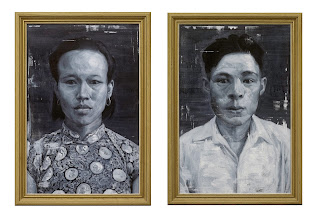三代人 Three Generations
 |
Three Generations三代人
Oil on linen
Set of 14, dimensions variable
183x122 cm;61x91.5cm; 61x46.5cm
|
From Malaya to Malaysia, A Diaspora Tale
In this body of paintings, I attempt to portray my family’s migratory story. Images of the paintings are sourced from my family’s collection of personal photographs and newspaper clippings and are translated into varying visual formats such as drawings, monochromatic paintings and lusciously colored oil paintings. Collectively, they depict the development of three generations of Chinese in Malaysia, from the arrival to the gradual integration into the Malaysian way-of-life, corresponding to Malaysia’s history and the social changes that occurred.
When the Malayan Union was formed into the Federation of Malaya in 1948, a large number of early Chinese immigrants decided to take up citizenship, denouncing their prior citizenship in China in a bid of farewell. My grandfather was one of them. In Malaya, he attempted to make a fresh start and started his career in an oil plantation, in which sometime later, he managed to secure a small stake as an owner. Though busy rebuilding a life in this new country, he would still retain ties with China, sending letters to relatives as well as giving financial support.
My family was housed in what were called “The New Village”, which were central camps constructed by the British government prior to independence and was an attempt by the British government to segregate and control the Malayan communist population. In 1974, more than a decade after the formation of the federation of Malaysia and independence from the British, the second Prime Minister of Malaysia, Tun Abdul Razak Hussein worked on establishing diplomatic ties with China, again rejuvenating my family’s relationship with the Motherland. During that time, my grandfather and father continued to visit relatives in China and while maintaining providing financial aid due to my family’s clan’s geopolitical relations.
In Malaysia, many Chinese were moving out of “The New Villages” and trying to adapt to a new living environment while attempting to safeguard their imported values and customs. In time, they gradually began to integrate with the local cultures from the varying ethnic communities and seeing them as different from their ancestor’s in China. Nowadays, Malaysian Chinese’s’ relationships with relatives in China is somewhat distant as they are more concerned with being Malaysian and embracing the spirit of the multicultural way of life. Most of them are not concerned with economic growth and the mother tongue education.
Politically, Malaysia experienced turbulent years in the mid 90s. In 1998, Deputy Prime Minister, Datuk Seri Anwar Ibrahim was sentenced to jail in which ignited the “Refomasi” movement. The movement eventually spilled into the streets and served as a catalyst to the political awakening in the Chinese community. The slogan “we’re all one house” (我们都是一家 人) resonate with the Chinese Malaysian identity and the desire for the country to be inclusive. From the Reformasi movement, the usually politically distant Chinese community became more politically and socially involved, passionate young Chinese were visible in other campaigns such as the Bersih rally and Stop Lynas.
Myself, a third-generation Malaysian Chinese has recently tied-the-knot with a Taiwan-born third-generation Chinese immigrant, forming a new generation of immigrant. Though our personal histories are still soaked with ties to China, we would continue the tale of diaspora while trying to adapt to our fluid social positions in Malaysia.





Comments
Post a Comment